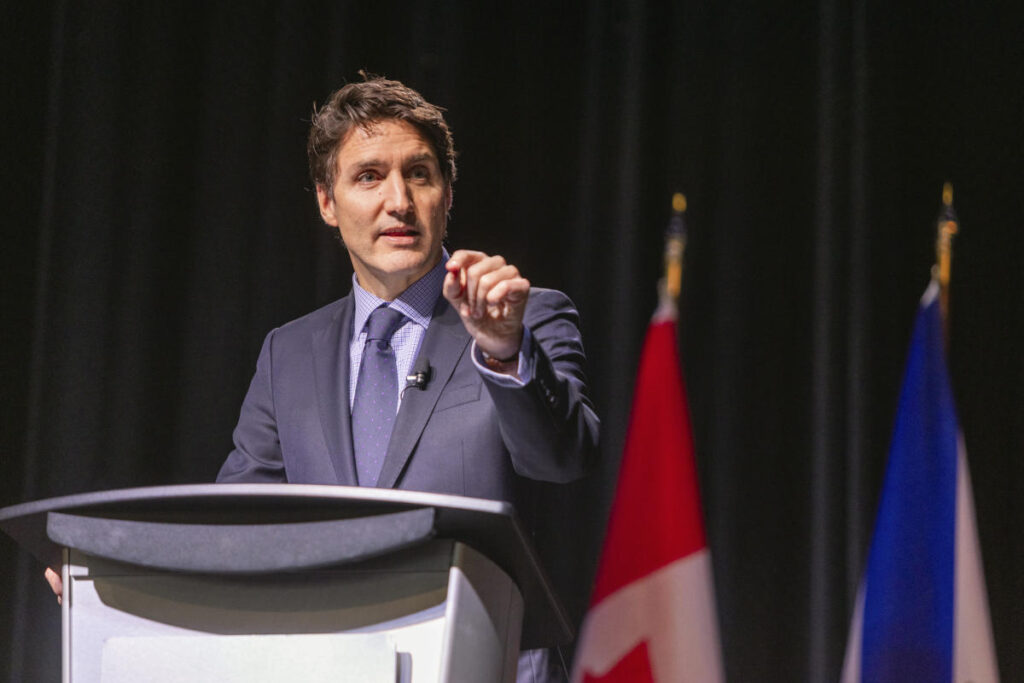Canadian Prime Minister Justin Trudeau articulated his concerns regarding the potential imposition of tariffs by President Donald Trump on imports from Canada during a recent event addressed to the Halifax Chamber of Commerce. Trudeau warned that such tariffs, projected to be as high as 25%, would significantly raise costs for American consumers and negatively impact the Canadian economy. He emphasized that American citizens are beginning to grasp the implications of these measures, which contradict Trump’s campaign promises of enhancing affordability for Americans. Trudeau expressed that the current negotiations with Trump’s administration may be more challenging than before due to a clearer agenda from the U.S. side compared to the uncertainty experienced after Trump’s initial election in 2016.
Trudeau asserted that Trump’s proposed tariffs could lead to higher prices for crucial imported goods, including food, clothing, and automobiles. He outlined that a substantial share of U.S. energy imports, particularly crude oil, comes from Canada, and highlighted the integration of trade between the two nations, citing that a significant percentage of American electricity and other essential commodities are sourced from Canadian markets. In defending against such potential tariffs, Trudeau reaffirmed Canada’s reliance on the American market, stressing that these tariffs would cause hardship not only for Canadians but also for many American consumers who depend on these imports.
In a light-hearted yet pointed response, Trump referred to Trudeau as the “Governor” of Canada in his social media post following Trudeau’s comments. This reference, made after a dinner held at Trump’s Mar-a-Lago, points to the ongoing tensions and miscommunications between the two leaders. Trump’s levity masks the seriousness of the proposed tariffs and their pronounced effects, which economists predict could disrupt not only international trade but also domestic pricing structures within the U.S. economy. Despite Trump’s humorous approach, both leaders acknowledge the potential fallout from heightened tariff barriers, which could serve as an impediment to enjoying the benefits of free trade.
As Trudeau stressed the seriousness of the situation, he recalled Canada’s past response to the U.S. tariffs imposed on steel and aluminum in 2018, where Canada retaliated with its own tariffs targeting politically sensitive U.S. products. He noted that such retaliatory measures, while essential to safeguard Canadian economic interests, should be carefully considered to avoid exacerbating tensions. The Prime Minister highlighted that the choices for tariffs at that time were deliberately aimed at products that held political significance for key U.S. lawmakers, thus reinforcing Canada’s strategy to create impactful responses that resonate on multiple levels.
Furthermore, Trudeau pointed out the inequity of categorizing Canada alongside Mexico concerning issues like immigration and drug trafficking. He underscored that the scale of fentanyl seizures at the Canadian border pales in comparison to those at the Mexican border, thus challenging Trump’s narrative about security concerns related to Canada. Trudeau also highlighted the relatively low number of irregular migrants crossing into the U.S. from Canada, contrasting sharply with the significant figures recorded at the southern border. This differentiation was intended to clarify the Canadian stance and to discourage the oversimplification of regional issues, emphasizing that there are distinct realities to address between the two borders.
In addressing the trade dynamics, Treasury Secretary Kirsten Hillman rebutted Trump’s claims about financial subsidies from the U.S. to Canada, pointing out that Canada accounts for a substantial amount of U.S. energy imports, which is crucial for both economies. She noted that the historical trade relationship heavily favors U.S. energy dependence on Canadian resources, emphasizing the volume of bilateral trade carried out daily. The strategic importance of Canada, as the leading foreign supplier of essential materials such as steel and aluminum to the U.S., underscores a relationship where mutual dependencies are crucial. Both leaders find themselves in a complex landscape as they navigate trade, tariffs, and broader economic ramifications, illustrating the intertwined fates of both nations amidst the evolving geopolitical climate.

